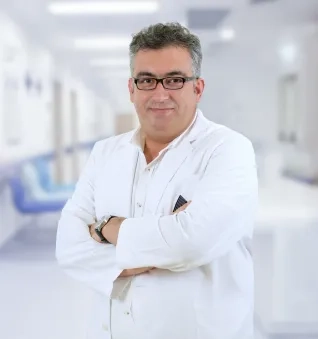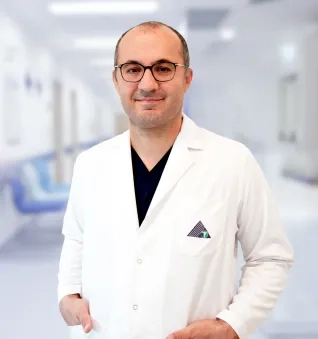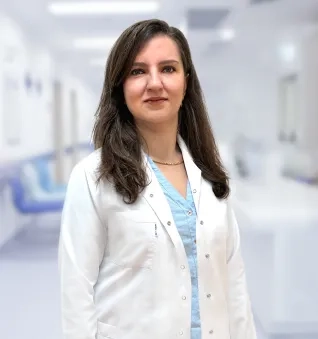Alo Yeditepe
Alo Yeditepe
Your Real Age Is Your Vascular Age
Pointing out that our vascular health is an important indicator for our general health, Yeditepe University Hospitals Cardiology Specialist Dr. Çiğdem Koca said; "If your vascular health is good, this means that you are younger than your age; if it is bad, it means that you are older."
The inner surface of our veins is covered with a membrane called 'endothelium'. Endothelin has many important tasks, from the fluidity of the blood to the prevention of clotting. Some factors, such as high cholesterol, diabetes, and smoking, lead to impaired endothelial function and vascular aging. "Therefore, if your veins are worn or clotted, you may be much older than your calendar age," said Cardiology Specialist Dr. Çiğdem Koca explained the causes of vascular aging and ways to protect vascular health as follows…
What is Vascular Age?
There are different criteria that we consider when evaluating a person's age. The chronologically determined calendar age and the person's vascular age may not always be the same. The aging of the body is not always related to the age of the calendar. This situation is also related to the person's "vascular age". The concept of "vascular age", which was developed based on the premise that "a person is as old as his/her veins", is a better guide for determining our health status than our calendar age.
How Does Vascular Aging Affect Our Health?
Vascular aging increases our risk of cardiovascular diseases. Many different clinical manifestations such as heart attack, sudden cardiac death, coronary angina (chest pain due to vascular occlusion), stroke, cerebral hemorrhage, obstructions in the leg veins, and heart failure are evaluated under "cardiovascular diseases". The advancement of our vascular age increases our likelihood of experiencing these diseases.
Why Do Our Veins Age?
Vascular aging actually begins in childhood. Several factors negatively affect vascular age by accelerating this aging process over time. These include diabetes, tobacco, and tobacco product use, high blood pressure, high cholesterol, and obesity. To illustrate with one example, a 40-year-old man with hypertension and high cholesterol who smokes has a 10-year risk of cardiovascular disease that is around 5 percent, which is equivalent to a 63-year-old man. In other words, the vein age of this person, whose calendar age is 40, is 63. The chronological age is 60, and the vascular age of a person who does not have blood pressure, diabetes, or cholesterol, does not smoke, and does regular sports is 40.
How Can We Keep Our Age Young?
While we cannot stop our chronological age from advancing, we can take measures to delay the aging of our veins. Providing weight control through low-calorie diets and exercise in overweight or obese individuals positively affects vascular age. Even if there is no problem with our weight control, we can take some precautions regarding our nutrition. Restricting the amount of sodium in the diet positively affects vascular age, both in the presence of hypertension and in all healthy individuals. Far from reducing it in our diet, there are also elements that we need to increase. Consumption of flavonoids, which are abundant in fruits and vegetables, seeds, and tea, will have a reducing effect on both our cardiovascular and cancer risk. In summary, if we can live a healthy life by adopting the right eating habits, avoiding smoking, exercising, paying attention to our mental health, and keeping our blood sugar, cholesterol levels, and blood pressure under control, we can have younger veins.
Press Coverage: sozcu
This content was prepared by Yeditepe University Hospitals Medical Editorial Board.
”
See Also
- What is Heart Rhythm Disorder (Arrhythmia)? Symptoms and Causes
- What is Sudden Cardiac Death? What are the Symptoms?
- Risk Factors in Heart Diseases
- How Do Heart Disease Risk Factors Affect Women and Men?
- What is a Heart Attack? What are the Symptoms of a Heart Attack?
- Carotid Artery Disease
- What is Intravenous Ultrasound (IVUS)?
- After a heart attack, the risk of mortality is higher in women than in men
- Is Your Heart Ready For Winter?
- The Risk of High Blood Pressure Increases as You Go to High Altitudes
- By 2025, Hypertension Patients Are Expected to Reach 1.5 Billion
- Misconceptions about the Female Heart
- Being Young Does Not Protect From Heart Disease!
- Coronary CT Angiography (Virtual Angiography)
- Effort Test
- Heart Attack Causes and Symptoms
- Goal in Heart Diseases; To reduce the loss of life by at least 25 percent by 2025
Alo Yeditepe







